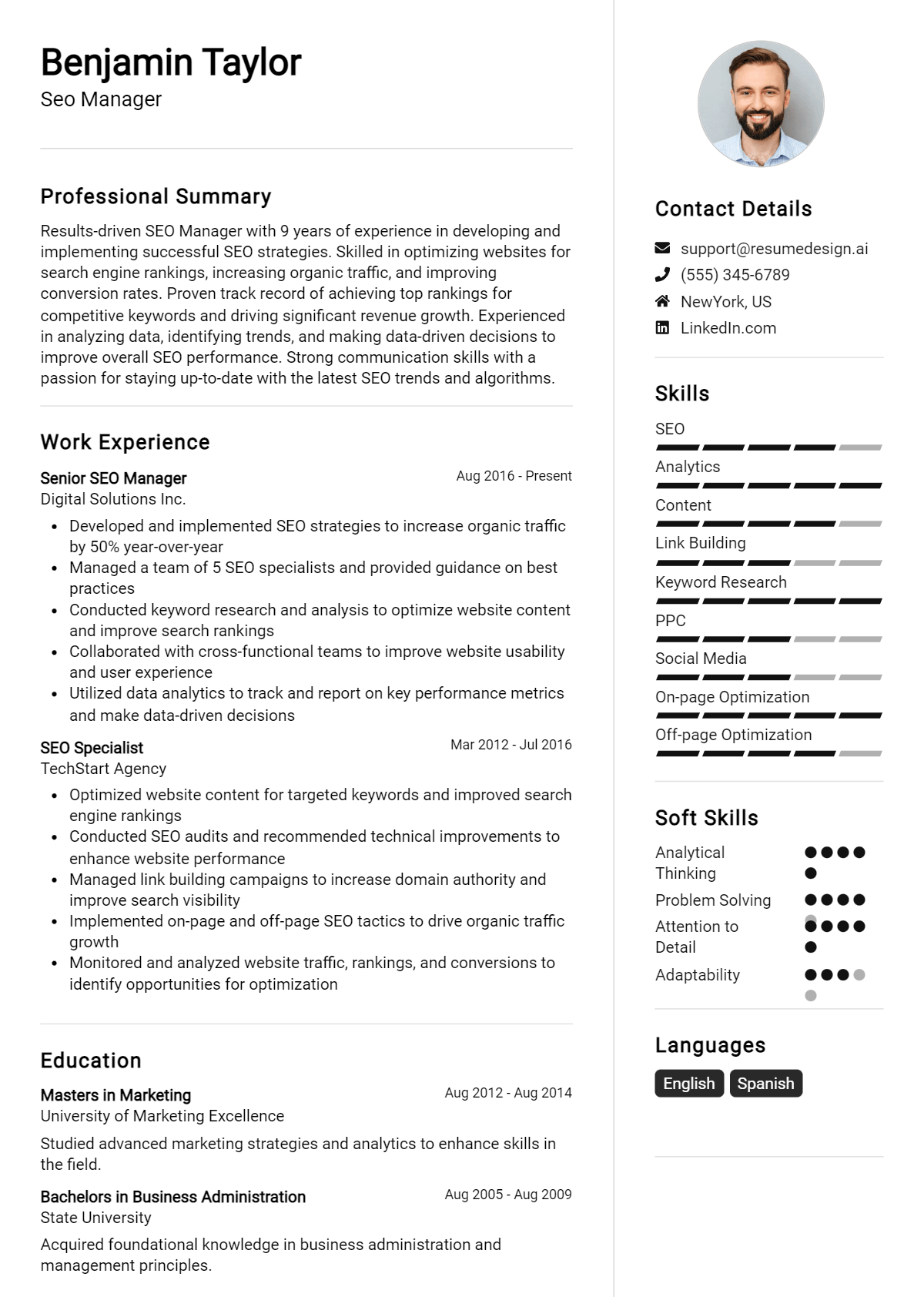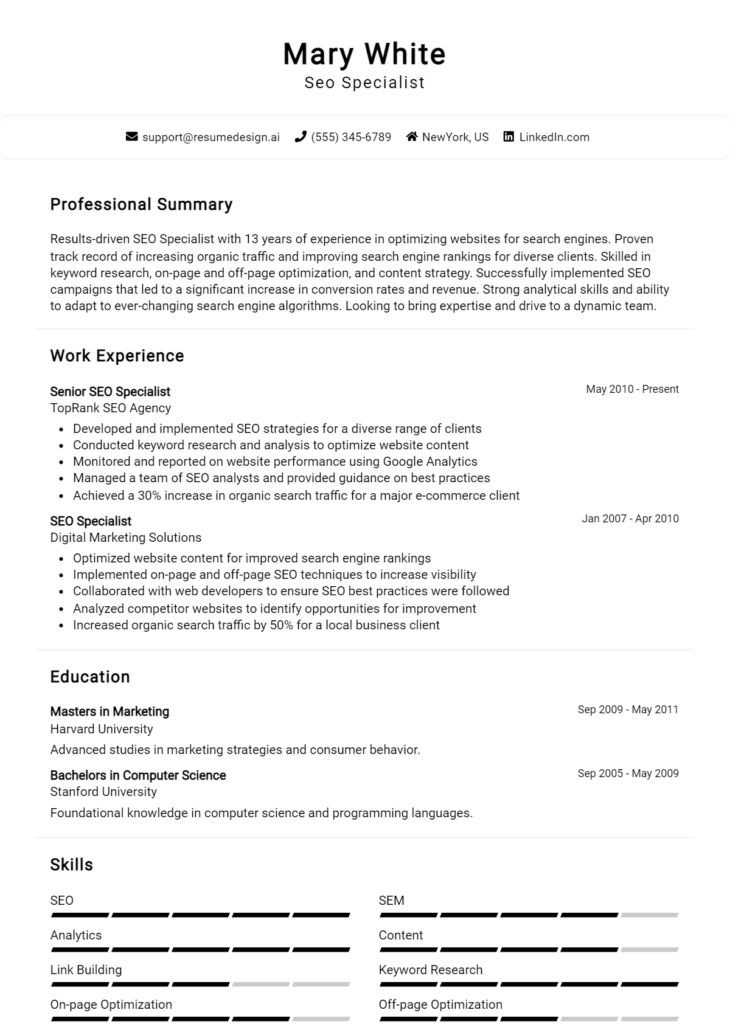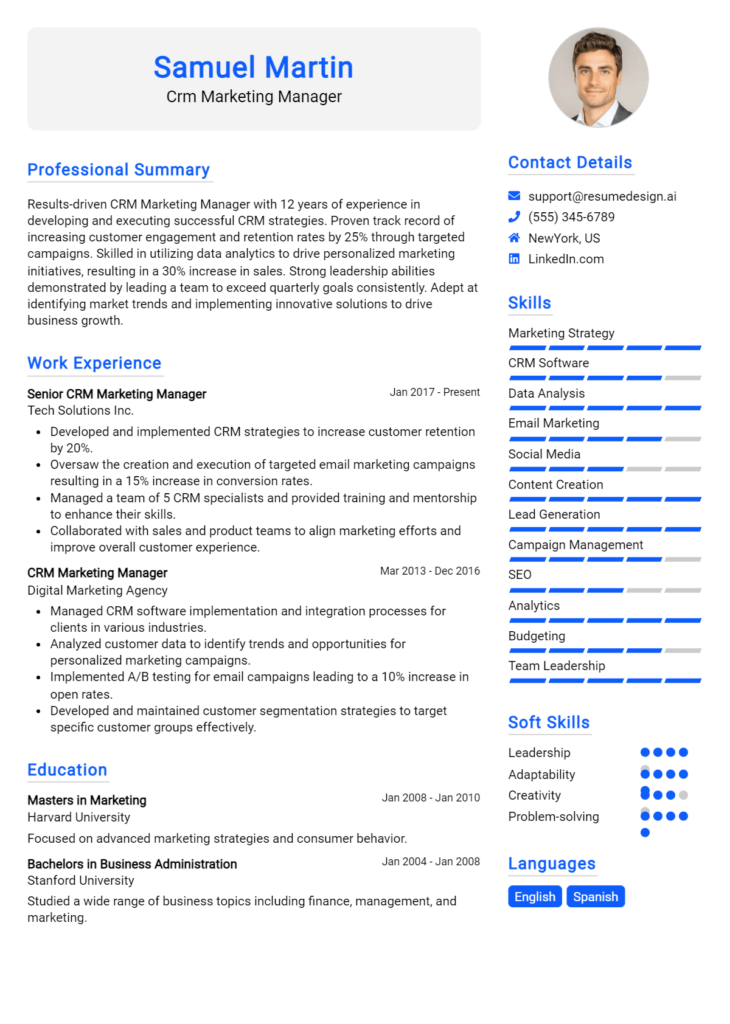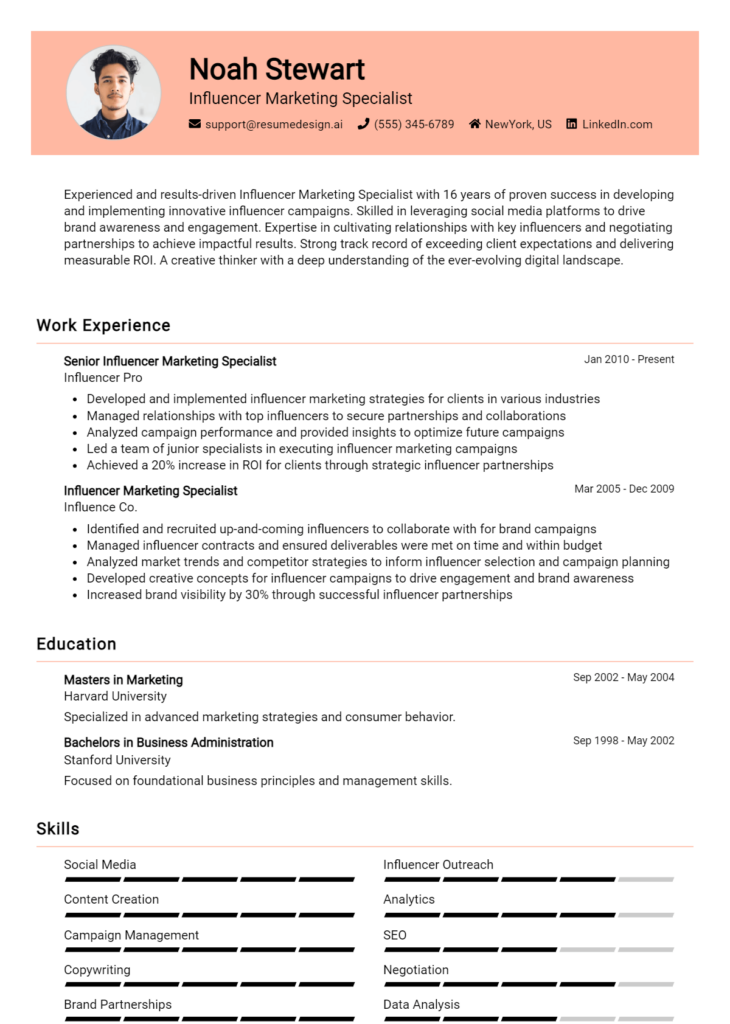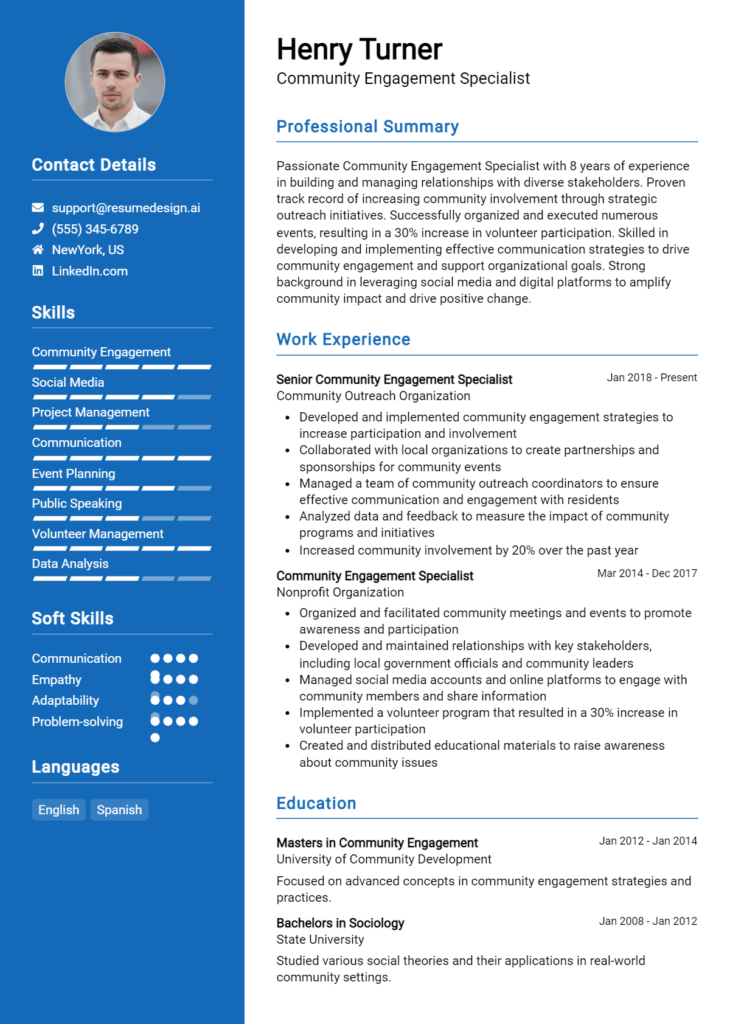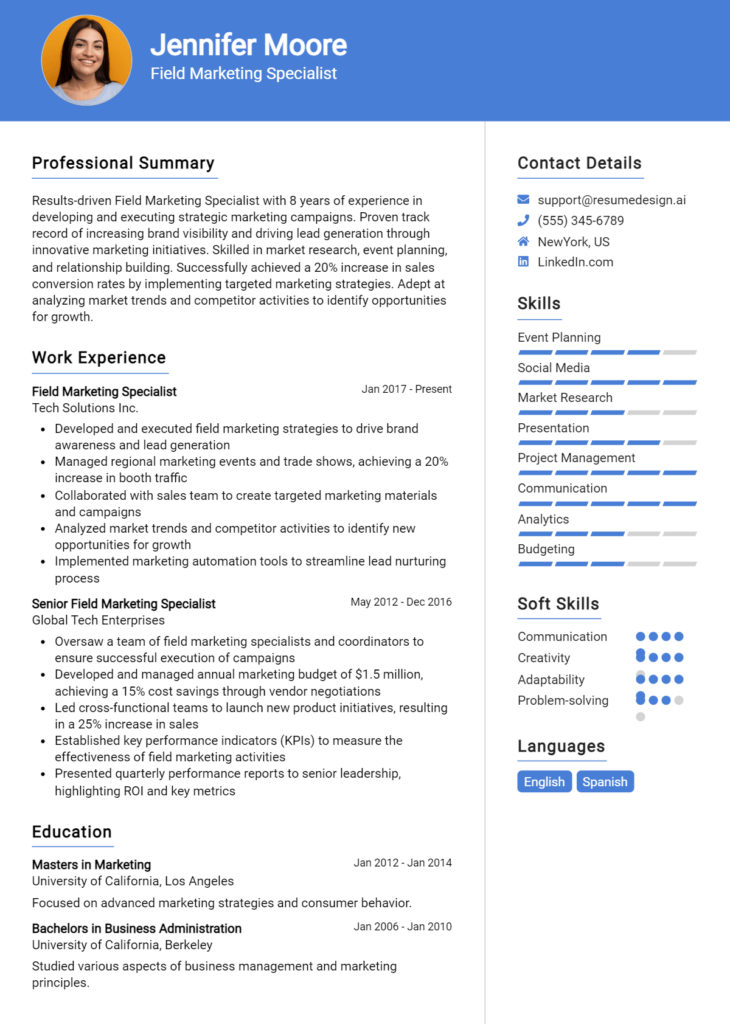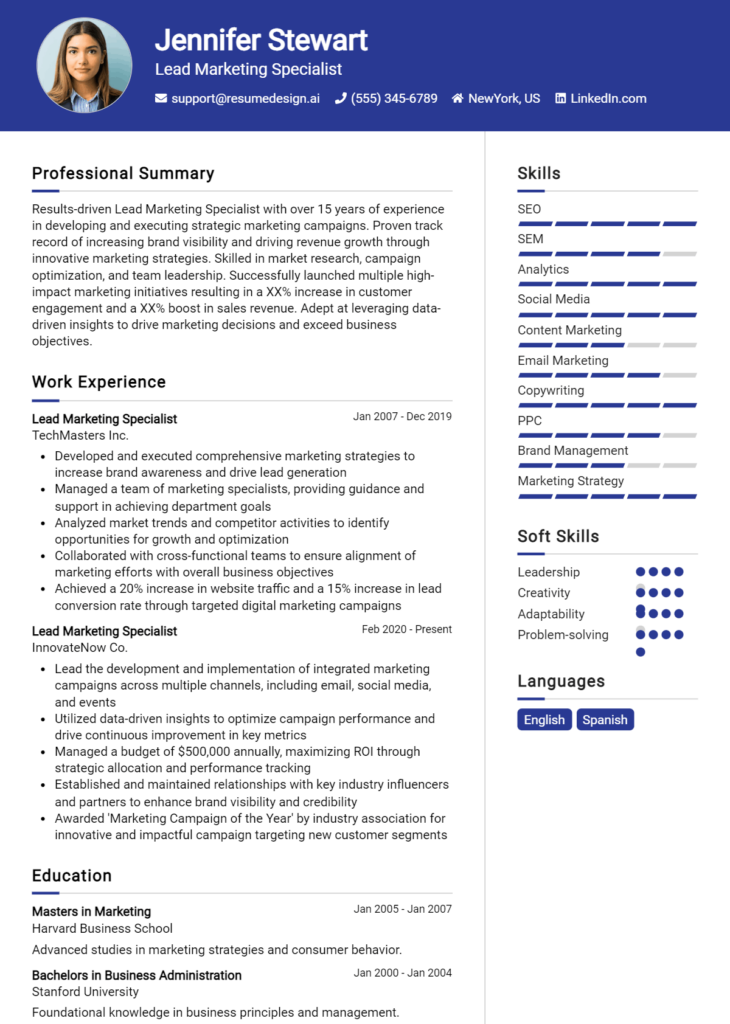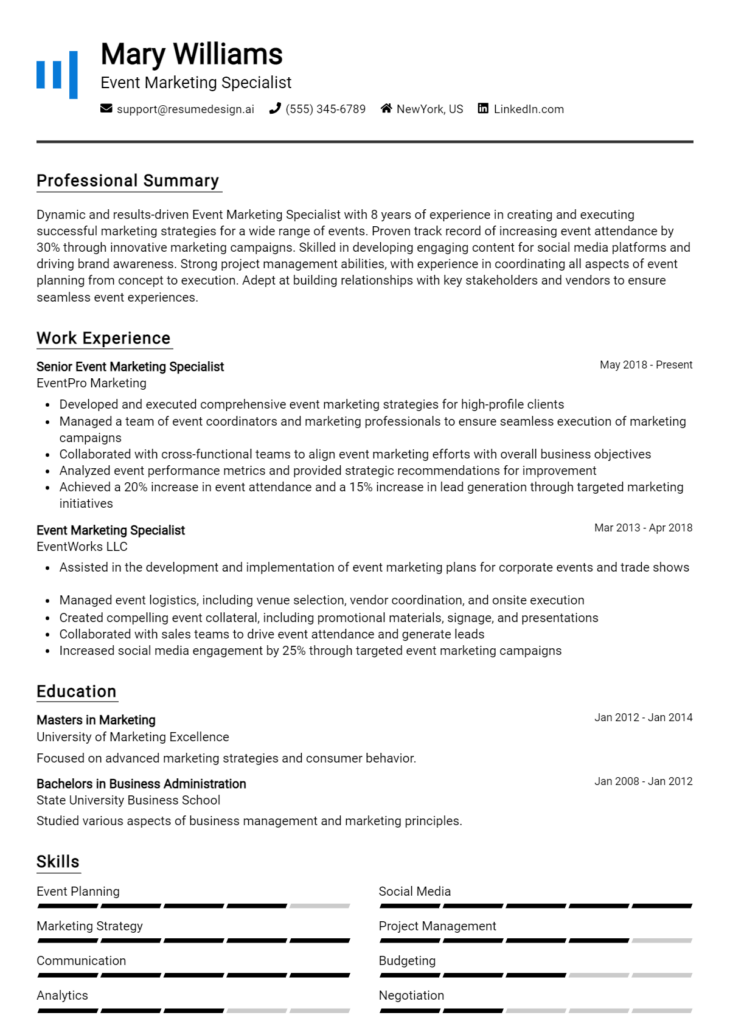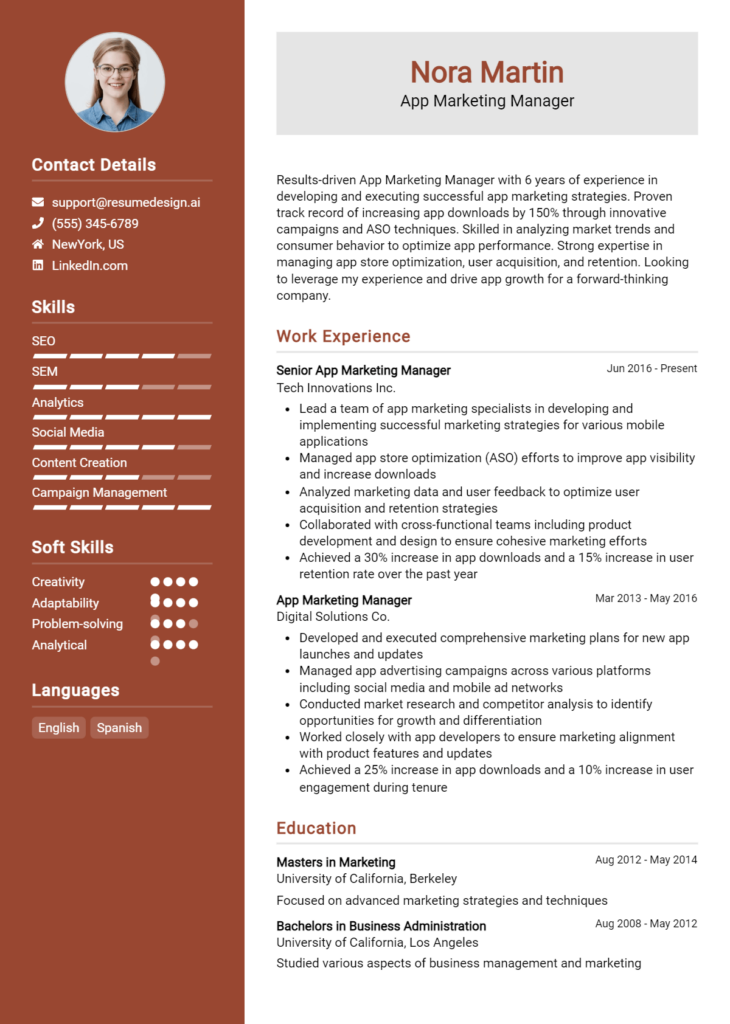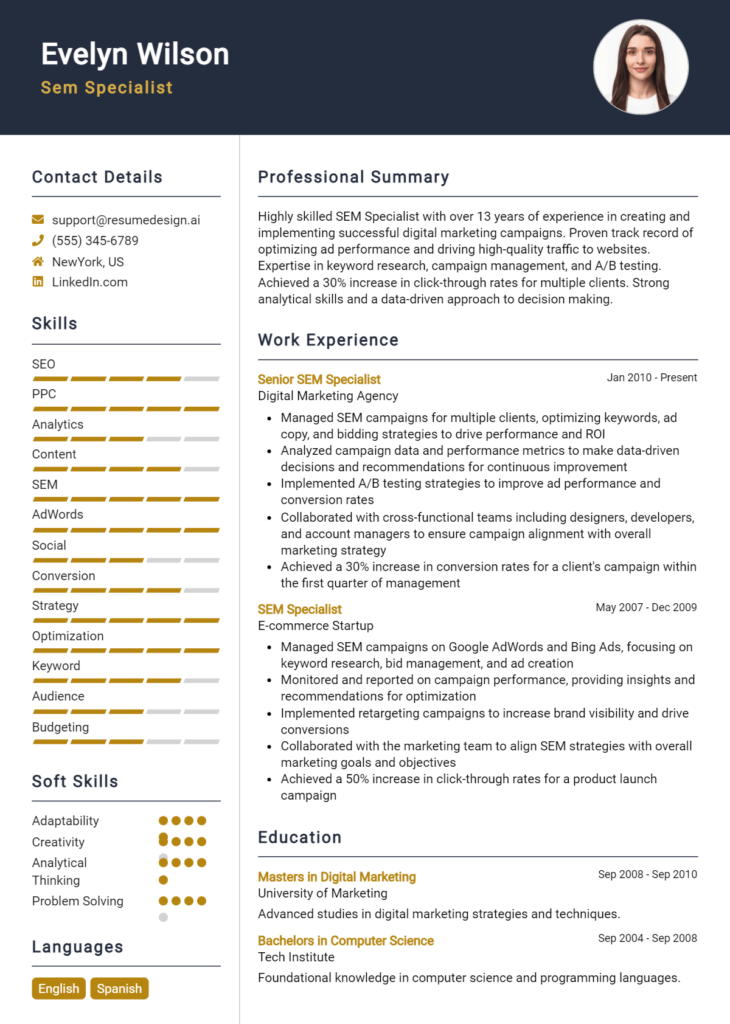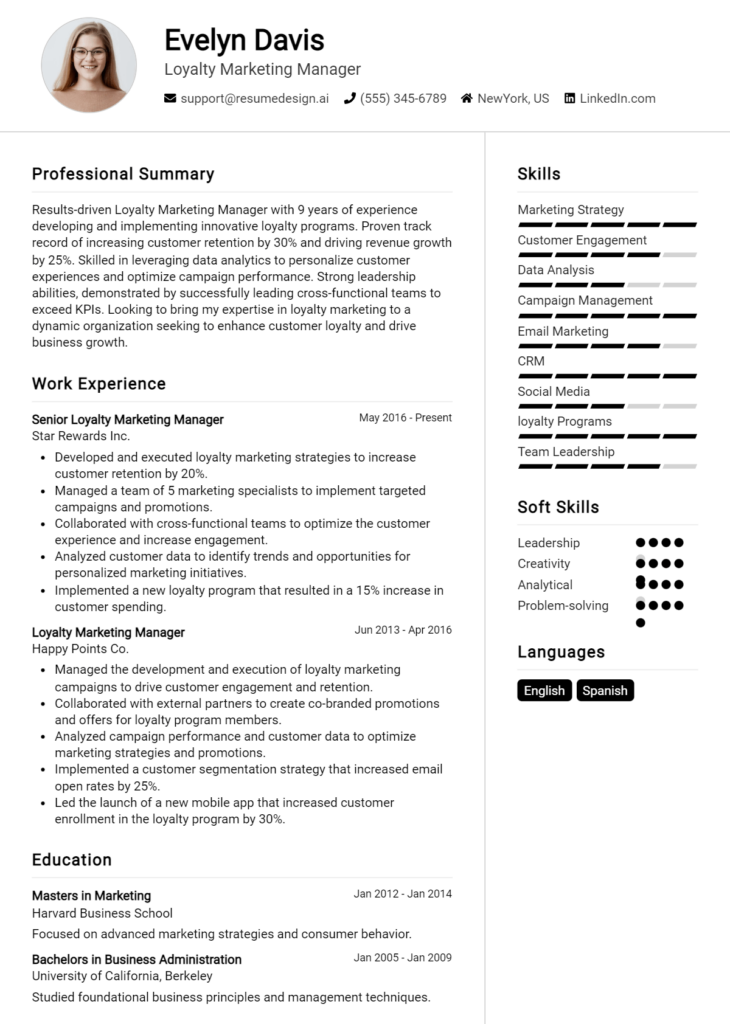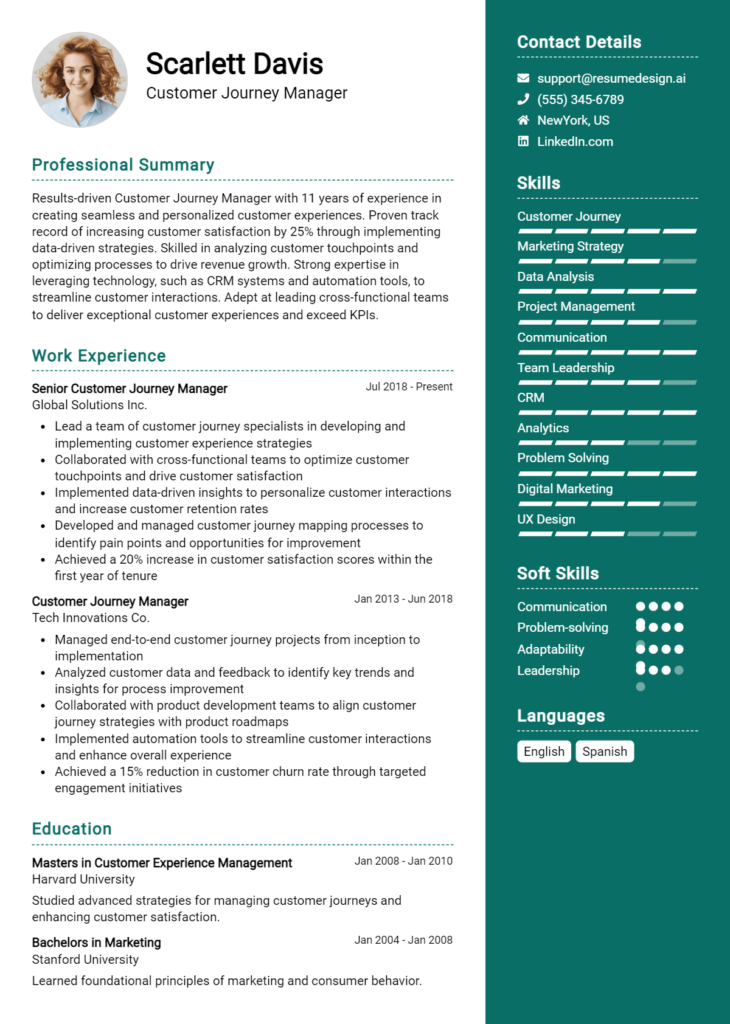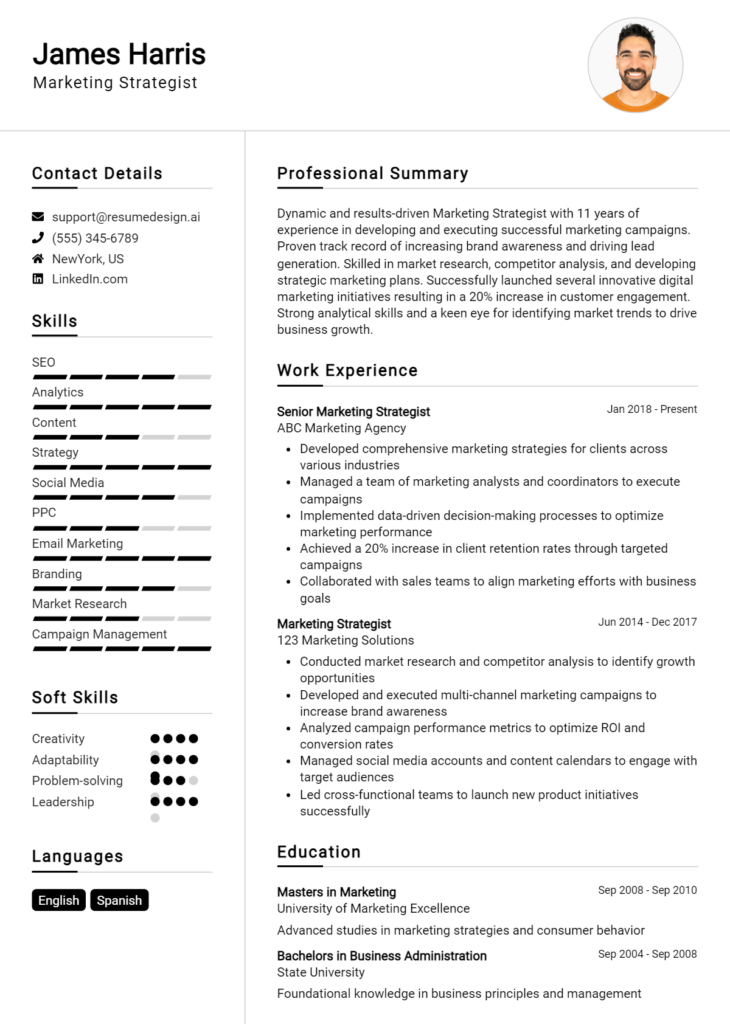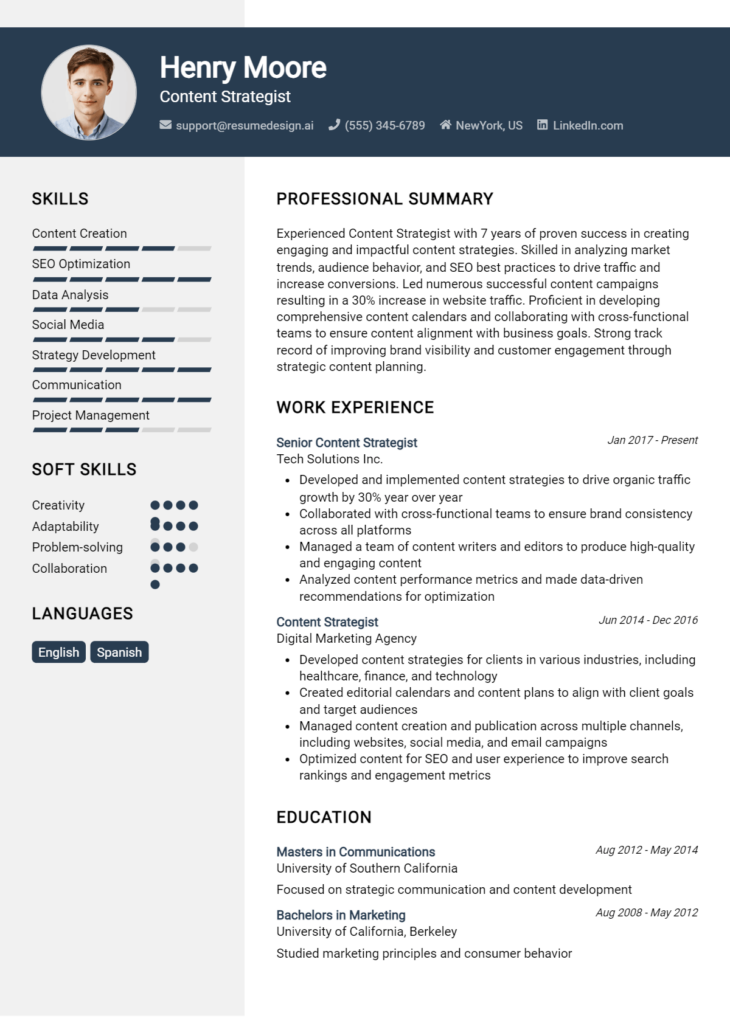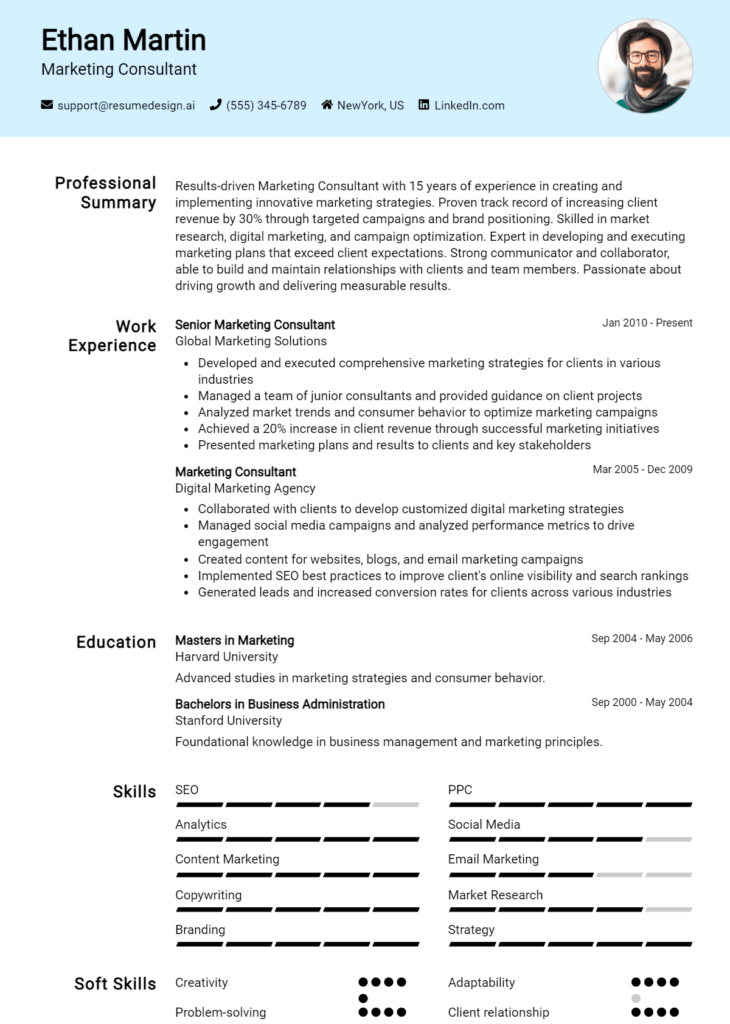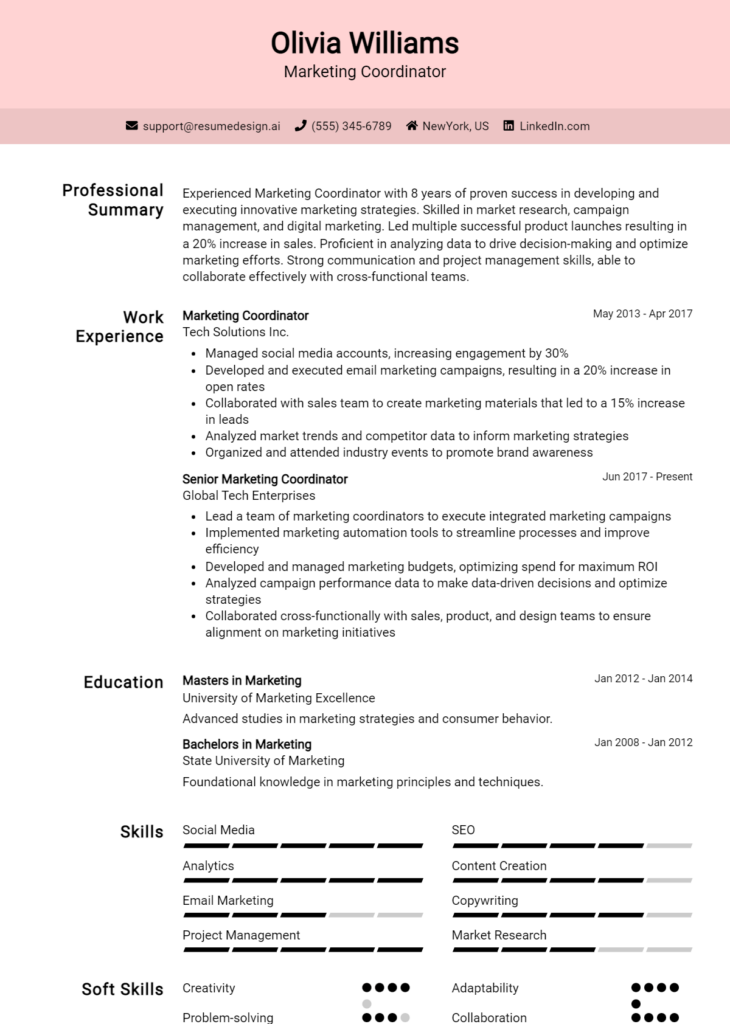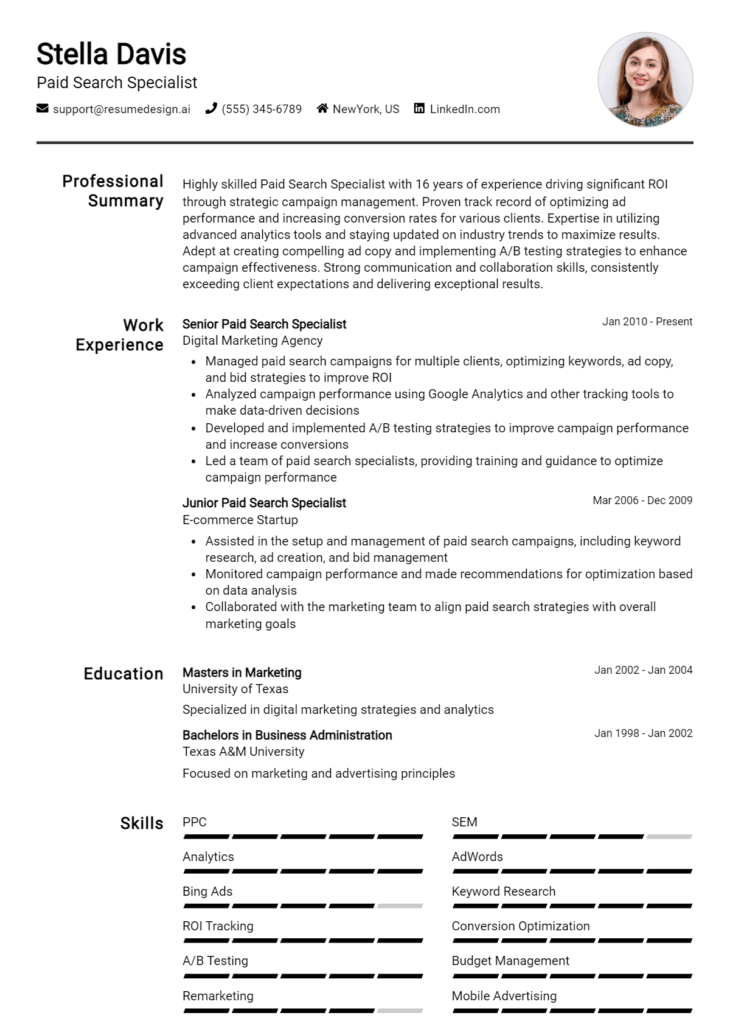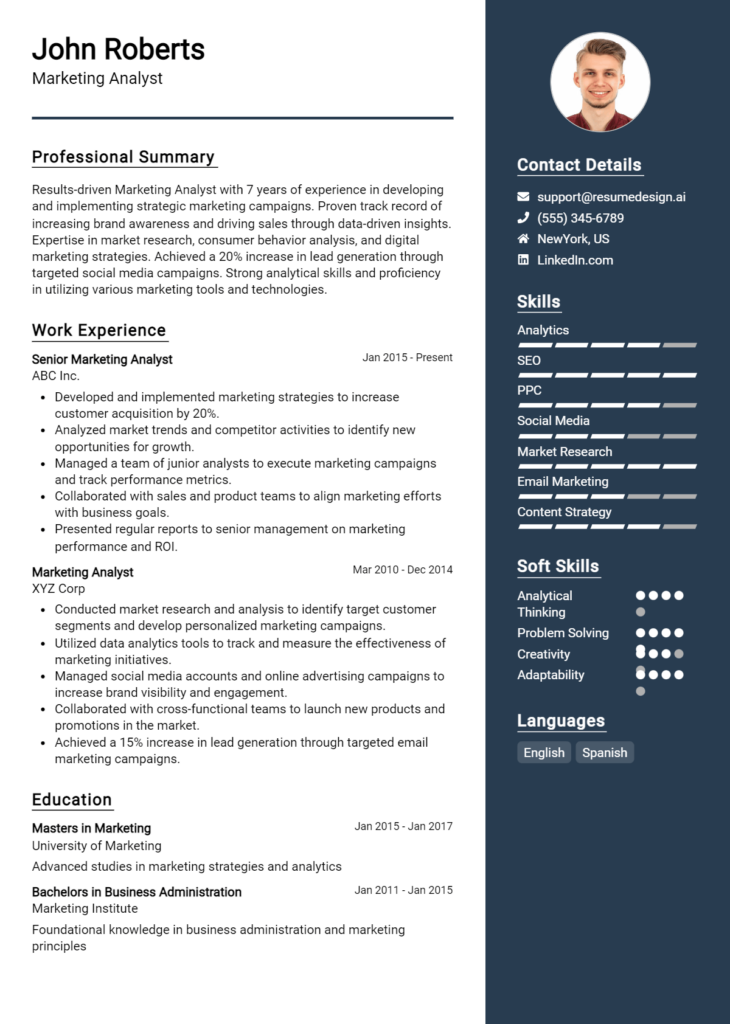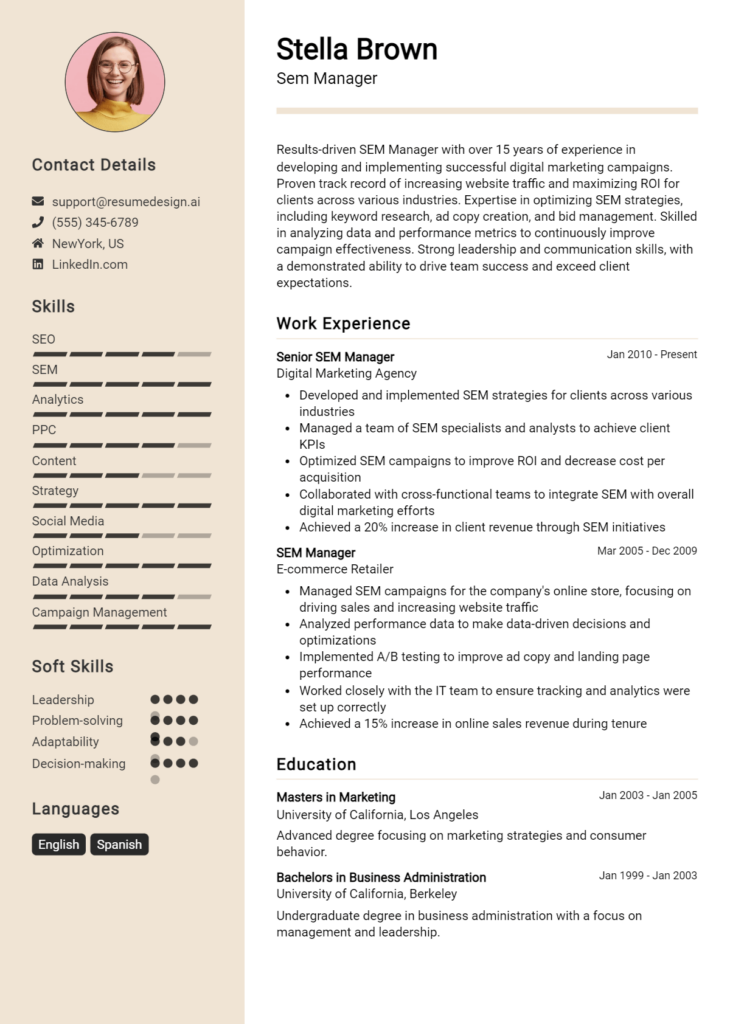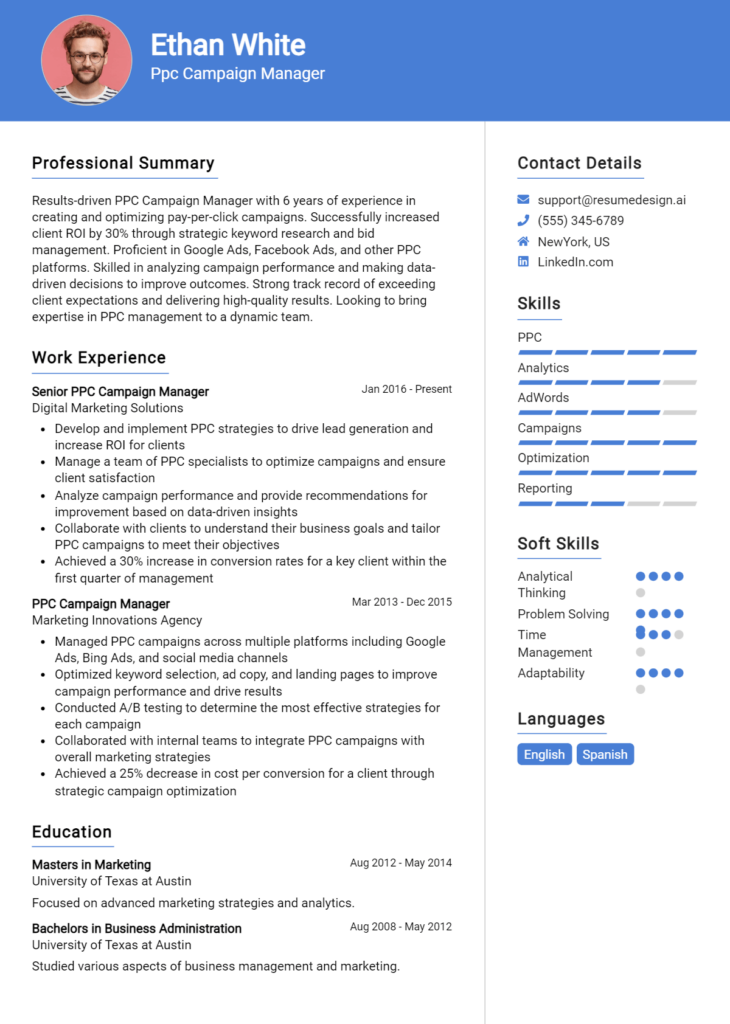SEO Manager Core Responsibilities
An SEO Manager plays a crucial role in enhancing a company's online visibility by developing and executing effective SEO strategies. This position requires a blend of technical expertise, operational skills, and strong problem-solving abilities to analyze search engine algorithms and improve website rankings. The SEO Manager collaborates across departments, including marketing, content creation, and IT, ensuring alignment with overall business goals. A well-structured resume highlighting these essential qualifications can significantly enhance job prospects in this competitive field.
Common Responsibilities Listed on SEO Manager Resume
- Developing and implementing SEO strategies to improve organic search rankings.
- Conducting keyword research to identify high-traffic, relevant keywords.
- Analyzing website performance using tools like Google Analytics and Search Console.
- Optimizing website content, metadata, and structure for search engines.
- Managing and monitoring backlinks to enhance domain authority.
- Staying updated on industry trends and algorithm changes.
- Collaborating with content creators to produce SEO-friendly content.
- Creating reports to track SEO performance and ROI.
- Providing training and guidance to team members on SEO best practices.
- Identifying and troubleshooting technical SEO issues.
- Overseeing local SEO initiatives to boost regional visibility.
- Working with UX/UI teams to ensure optimal website user experience.
High-Level Resume Tips for SEO Manager Professionals
In the competitive field of digital marketing, a well-crafted resume serves as your first line of defense in making a lasting impression on potential employers. For SEO Manager professionals, this document is not just a summary of experience; it is an opportunity to showcase your unique skills, achievements, and understanding of the ever-evolving SEO landscape. A strong resume should reflect your ability to drive organic traffic, improve search rankings, and contribute to the overall success of a business. This guide will provide practical and actionable resume tips specifically tailored for SEO Manager professionals, helping you stand out in a crowded job market.
Top Resume Tips for SEO Manager Professionals
- Tailor your resume to match the job description, incorporating relevant keywords and phrases to pass through Applicant Tracking Systems (ATS).
- Highlight your relevant work experience by focusing on specific roles that demonstrate your expertise in SEO strategies and tools.
- Quantify your achievements with concrete metrics, such as percentage increases in organic traffic, keyword rankings, or conversion rates.
- Showcase industry-specific skills, including familiarity with SEO tools (e.g., Google Analytics, SEMrush, Ahrefs) and techniques like on-page optimization and link building.
- Include a summary statement at the top of your resume that captures your professional identity and unique value proposition as an SEO Manager.
- Demonstrate your continuous learning by mentioning relevant certifications, courses, or workshops that keep you updated on SEO trends and best practices.
- Utilize clear and concise language, avoiding jargon that may confuse hiring managers who may not be SEO specialists themselves.
- Incorporate relevant projects or case studies that illustrate your problem-solving skills and ability to deliver results in the SEO domain.
- Maintain a clean, professional format that ensures readability and draws attention to the most important information.
By implementing these tips, you can significantly enhance your chances of landing a job in the SEO Manager field. A polished and targeted resume not only showcases your qualifications but also demonstrates your commitment to achieving excellence in SEO, ultimately setting you apart from other candidates.
Why Resume Headlines & Titles are Important for SEO Manager
In the competitive field of digital marketing, an SEO Manager's resume must stand out to capture the attention of hiring managers. Resume headlines and titles play a crucial role in this process, serving as the first impression that can either engage or dissuade potential employers. A strong headline or title not only grabs attention but also succinctly summarizes a candidate's key qualifications in a single, impactful phrase. When crafted effectively, these headlines should be concise, relevant, and directly related to the job being applied for, ensuring that they resonate with hiring managers and reflect the candidate's expertise in search engine optimization.
Best Practices for Crafting Resume Headlines for SEO Manager
- Keep it concise: Aim for a headline that is no longer than 10-12 words.
- Be role-specific: Use keywords that are directly related to the SEO Manager position.
- Highlight key accomplishments: Incorporate quantifiable achievements when possible.
- Focus on skills: Mention specific SEO skills that align with the job description.
- Use action verbs: Start with strong action verbs to convey dynamism and expertise.
- Tailor for the job: Customize the headline for each application to reflect the specific role.
- Avoid jargon: Use clear and straightforward language to ensure readability.
- Make it impactful: Choose words that evoke a sense of professionalism and competence.
Example Resume Headlines for SEO Manager
Strong Resume Headlines
"Results-Driven SEO Manager with 5+ Years of Experience in Driving Organic Traffic"
“Innovative SEO Specialist with Proven Track Record of Increasing Rankings by 150%”
“Data-Driven SEO Manager Focused on ROI and Strategic Growth”
Weak Resume Headlines
“SEO Manager Looking for a Job”
“Experienced Professional in Marketing”
The strong headlines are effective because they clearly communicate the candidate's specific skills, experience, and measurable accomplishments, making it easy for hiring managers to see their value at a glance. In contrast, the weak headlines fail to impress due to their vagueness and lack of specificity, leaving hiring managers uncertain about the candidate's qualifications and expertise. By using compelling and targeted headlines, candidates can significantly enhance their chances of standing out in a crowded job market.
Writing an Exceptional SEO Manager Resume Summary
A well-crafted resume summary is crucial for an SEO Manager as it serves as the first impression for hiring managers, quickly capturing their attention. This concise paragraph should highlight key skills, relevant experience, and notable accomplishments that align with the job role. An impactful summary not only showcases the candidate's qualifications but also demonstrates their understanding of SEO strategies and their ability to drive results. Tailoring the summary to the specific job description ensures that it resonates with the employer, increasing the chances of landing an interview.
Best Practices for Writing a SEO Manager Resume Summary
- Quantify achievements whenever possible to demonstrate impact (e.g., "increased organic traffic by 50%").
- Focus on relevant skills such as keyword research, on-page optimization, and analytics tools.
- Tailor the summary to match the job description, incorporating keywords and phrases from the listing.
- Keep it concise, ideally between 3 to 5 sentences, to maintain the reader's attention.
- Highlight technical skills alongside soft skills, such as leadership and communication.
- Use strong action verbs to convey a sense of accomplishment and proactivity.
- Showcase industry knowledge and familiarity with current SEO trends and best practices.
- Be authentic and reflect your unique personal branding to stand out from other candidates.
Example SEO Manager Resume Summaries
Strong Resume Summaries
Results-driven SEO Manager with over 5 years of experience in developing and implementing SEO strategies that increased organic traffic by 70% year-over-year. Skilled in keyword research, content optimization, and analytics tools such as Google Analytics and SEMrush.
Dynamic SEO Manager with a proven track record of enhancing website visibility and driving engagement, leading to a 40% boost in conversion rates. Expertise in technical SEO, link-building strategies, and market analysis, ensuring alignment with business objectives.
Accomplished SEO Manager with a history of managing successful campaigns across diverse industries, achieving an average page one ranking for 90% of targeted keywords. Adept at leveraging data-driven insights to refine strategies and optimize performance.
Weak Resume Summaries
Experienced in SEO and digital marketing. I have worked in various roles and can help improve website rankings.
SEO Manager with knowledge of SEO practices and tools. I am looking to apply my skills to a new position.
The examples provided illustrate the stark contrast between strong and weak resume summaries. Strong summaries are specific, quantifiable, and tailored to showcase relevant skills and accomplishments that directly relate to the SEO Manager role. In contrast, weak summaries lack detail, are overly generic, and fail to convey any measurable achievements, making them less impactful to hiring managers.
Work Experience Section for SEO Manager Resume
The work experience section of an SEO Manager resume is critical as it serves as a platform for candidates to demonstrate their technical skills, team management capabilities, and the ability to deliver high-quality results. This section not only highlights relevant job roles but also allows candidates to showcase their achievements through quantifiable results. Aligning past experiences with industry standards is essential, as it provides potential employers with insight into the candidate's expertise and their potential for contributing to the organization's success.
Best Practices for SEO Manager Work Experience
- Use clear, action-oriented language to describe your responsibilities and achievements.
- Quantify results whenever possible, such as percentage increases in organic traffic or improvements in keyword rankings.
- Highlight specific SEO tools and technologies you are proficient in, such as Google Analytics, SEMrush, or Moz.
- Include examples of successful team collaboration, such as leading cross-functional projects or mentoring junior staff.
- Align your experiences with industry best practices and current trends in SEO.
- Showcase your ability to adapt to changes in search engine algorithms and your strategies for staying updated.
- Detail your contributions to high-quality content creation and optimization processes.
- Focus on the strategic aspects of your role, such as developing SEO strategies and measuring their effectiveness.
Example Work Experiences for SEO Manager
Strong Experiences
- Increased organic traffic by 75% within six months through targeted keyword optimization and content strategy overhaul.
- Led a team of five SEO specialists in a successful site migration, resulting in a 50% reduction in bounce rates and improved user engagement metrics.
- Implemented data-driven SEO strategies that contributed to a 40% growth in revenue from organic channels year-over-year.
- Collaborated with marketing and content teams to develop a comprehensive SEO plan that aligned with broader business goals, achieving top rankings for 10 key industry terms.
Weak Experiences
- Worked on various SEO tasks without specifying outcomes or results.
- Assisted in content creation and optimization but did not quantify contributions.
- Participated in team meetings to discuss SEO strategies without detailing specific responsibilities or achievements.
- Managed SEO projects but failed to highlight any measurable success or impact on traffic and rankings.
The examples above illustrate the distinction between strong and weak work experiences. Strong experiences effectively quantify achievements, demonstrating a clear impact on the organization’s SEO performance. They also highlight leadership and collaboration, showcasing the candidate’s ability to drive results. In contrast, weak experiences lack specificity, measurable outcomes, and fail to convey the candidate's role in achieving success, leaving the hiring manager without a clear understanding of the candidate's capabilities.
Education and Certifications Section for SEO Manager Resume
The education and certifications section of an SEO Manager resume is crucial for illustrating the candidate's academic background, industry-relevant certifications, and commitment to continuous learning. This section not only showcases the formal education that provides foundational knowledge in marketing, analytics, and technology but also highlights specialized certifications that demonstrate expertise in SEO methodologies and tools. By including relevant coursework, certifications, and any specialized training, candidates enhance their credibility and align themselves more closely with the requirements of the job role, making a compelling case to potential employers.
Best Practices for SEO Manager Education and Certifications
- Focus on relevant degrees such as Marketing, Communications, or Computer Science.
- Highlight industry-recognized certifications from reputable organizations like Google or HubSpot.
- Include specialized training in SEO tools like SEMrush, Moz, or Ahrefs.
- Be specific about relevant coursework that pertains to digital marketing or analytics.
- List certifications in chronological order, starting with the most recent.
- Use clear headings and formatting to make this section easy to navigate.
- Consider including ongoing education efforts, such as recent workshops or webinars.
- Only include certifications that are current and relevant to the SEO landscape.
Example Education and Certifications for SEO Manager
Strong Examples
- Bachelor of Science in Marketing from the University of California, Berkeley.
- Google Analytics Individual Qualification (GAIQ) certification.
- HubSpot Content Marketing Certification.
- Advanced SEO Strategies course from a recognized online learning platform.
Weak Examples
- Associate Degree in Fine Arts from a local community college.
- Certification in Basic HTML from a non-accredited institution.
- Outdated SEO certification from a now-defunct organization.
- High School Diploma without any relevant courses or additional qualifications.
The strong examples listed above are considered effective because they directly relate to the skills and knowledge required for an SEO Manager role, showcasing relevant education and credentials from reputable sources. In contrast, the weak examples lack relevance to the SEO field, either due to their general nature, outdated information, or lack of recognized value, which does not enhance the candidate's qualifications for the position.
Top Skills & Keywords for SEO Manager Resume
As an SEO Manager, the relevance of showcasing an array of skills on your resume cannot be overstated. In a competitive digital landscape, hiring managers are on the lookout for candidates who not only possess technical expertise but also demonstrate strong interpersonal abilities. A well-rounded skill set not only highlights your proficiency in optimizing websites for search engines but also reflects your capability to collaborate with diverse teams, analyze data effectively, and adapt to changing trends in the industry. Crafting a comprehensive resume that emphasizes both hard and soft skills is essential for standing out in the hiring process and securing a position that aligns with your career goals.
Top Hard & Soft Skills for SEO Manager
Soft Skills
- Communication
- Teamwork
- Problem-solving
- Critical thinking
- Adaptability
- Time management
- Creativity
- Attention to detail
- Project management
- Analytical mindset
Hard Skills
- Keyword research
- On-page SEO optimization
- Technical SEO
- Google Analytics
- SEO tools proficiency (e.g., SEMrush, Moz, Ahrefs)
- Link building strategies
- Content marketing
- HTML/CSS basics
- Data analysis
- Familiarity with CMS platforms (e.g., WordPress, Joomla)
By emphasizing these skills on your resume, you can effectively showcase your qualifications for the SEO Manager role, complementing your work experience to present a compelling case to potential employers.
Stand Out with a Winning SEO Manager Cover Letter
I am excited to apply for the SEO Manager position at [Company Name], as advertised on [where you found the job posting]. With over [number] years of experience in digital marketing and a proven track record of optimizing websites for organic search performance, I am confident in my ability to drive significant traffic and enhance the online visibility of your brand. My expertise lies in developing and executing comprehensive SEO strategies, conducting in-depth keyword research, and leading cross-functional teams to achieve measurable results.
At my previous position with [Previous Company Name], I successfully spearheaded multiple SEO initiatives that resulted in a [specific percentage] increase in organic traffic over [time frame]. By leveraging data analytics tools and employing best practices in on-page and off-page optimization, I was able to enhance our website’s ranking for competitive keywords. Additionally, my experience in collaborating with content creators and web developers has allowed me to ensure that SEO principles are integrated throughout all stages of content production, leading to cohesive and effective marketing strategies.
I am particularly drawn to [Company Name] because of [specific reason related to the company, such as its innovative approach, reputation in the industry, or commitment to sustainability]. I admire your commitment to [specific aspect of the company’s mission or values], and I am eager to contribute my skills to help elevate your online presence. I am especially interested in leveraging my experience with [specific tools or methodologies relevant to the company] to enhance your SEO efforts and achieve your business objectives.
Thank you for considering my application. I look forward to the opportunity to discuss how my background, skills, and enthusiasms align with the goals of [Company Name]. I am excited about the possibility of joining your team and contributing to your continued success in the digital landscape.
Common Mistakes to Avoid in a SEO Manager Resume
When crafting a resume for the SEO Manager position, it's crucial to present your skills and experience in a way that stands out to potential employers. However, many candidates make common mistakes that can undermine their chances of landing an interview. Recognizing and avoiding these pitfalls can significantly enhance the effectiveness of your resume and showcase your expertise in the competitive field of search engine optimization. Here are some frequent mistakes to watch out for:
Vague Job Descriptions: Failing to provide specific details about your previous roles can leave employers unsure of your actual responsibilities and achievements. Use quantifiable metrics to highlight your impact.
Ignoring Keywords: Just like in SEO, the use of relevant keywords in your resume is essential. Not incorporating industry-specific terms can make it difficult for hiring managers and applicant tracking systems to find your resume.
Lack of Tailoring: Sending out a generic resume for every job application is a missed opportunity. Tailor your resume to each position by emphasizing relevant skills and experiences that align with the job description.
Overloading with Jargon: While technical terms are important in SEO, overloading your resume with jargon can alienate readers who might not be familiar with every term. Strive for a balance that maintains professionalism while remaining accessible.
Neglecting Soft Skills: SEO Managers often need to collaborate with various teams, so overlooking soft skills such as communication, leadership, and problem-solving can be a major oversight in your resume.
Failing to Showcase Results: Employers want to see the outcomes of your SEO strategies. Highlighting specific achievements, such as increased organic traffic percentages or improved search rankings, can set you apart from other candidates.
Poor Formatting: A cluttered or unprofessional resume layout can distract from your qualifications. Ensure your resume is visually appealing, easy to read, and organized in a logical manner.
Omitting Continuous Learning: The SEO field is constantly evolving, so neglecting to mention any recent courses, certifications, or conferences can give the impression that you are not keeping up with industry trends.
Conclusion
As we've explored throughout this article, the role of an SEO Manager is pivotal in enhancing a company's online visibility and driving organic traffic. Key responsibilities include developing effective SEO strategies, conducting keyword research, optimizing website content, and analyzing performance metrics. To succeed in this competitive field, an SEO Manager must possess a blend of technical skills, analytical thinking, and creativity.
To ensure your resume reflects the necessary expertise and stands out to potential employers, it's crucial to review and update it regularly. Highlight your achievements, quantify your impact, and tailor your resume to the specific SEO roles you're applying for.
Ready to take the next step in your career? Now is the perfect time to refine your SEO Manager resume. Utilize the available resources such as resume templates, which provide a polished format; the resume builder, which offers an easy way to create a professional document; and resume examples to inspire your content. Don't forget to enhance your application with a compelling cover letter template that showcases your skills and passion for SEO. Take action today to ensure your resume opens the door to your next opportunity!

